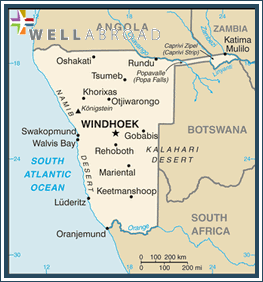|
MOST RECENT ALERTS
There's no recent alert.
|

|
|||||||||||||||
| COUNTRY OVERVIEW | ||||||||||||||||
|---|---|---|---|---|---|---|---|---|---|---|---|---|---|---|---|---|
|
| COUNTRY GENERAL INFORMATION | |||||||
|---|---|---|---|---|---|---|---|
| Language: |
English 7% (official), Afrikaans common language of most of the population and about 60% of the white population, German 32%, indigenous languages (Oshivambo, Herero, Nama) |
||||||
| Currency: | Namibian Dollar (NAD); South African Rand (ZAR) | ||||||
| Predominant Religions: |
Christian 80% to 90% (Lutheran 50% at least), indigenous beliefs 10% to 20% |
||||||
| National Holidays: | Independence Day, 21 March (1990) | ||||||
| Economic Status: |
Namibia is a southern African country with a moderately developed economy. A high per capita GDP, relative to the region, hides the world's worst inequality of income distribution. The Namibian economy is closely linked to South Africa with the Namibian dollar pegged one-to-one to the South African rand. |
||||||
| Security: |
Namibian Defense Force: Army, Air Wing, Navy |
||||||
| US Presence: | |||||||
| Document Requirements: |
A passport and visa are normally required. Bearers of U.S. passports who plan to visit Namibia for tourism for less than 90 days can obtain visas at the port of entry and do not need visas prior to entering the country. Travelers coming for work or study, whether paid or voluntary, must obtain a work or study permit prior to entering Namibia. All travelers traveling to or from Namibia via South Africa are strongly encouraged to have several unstamped visa pages left in their passports. South Africa requires two unstamped visa pages, and Namibia usually also requires an unstamped page to stamp a visa upon arrival. Visitors who do not have enough free visa pages in their passport risk being denied entry and returned to the U.S. at their own expense. Travelers should obtain the latest information from the Embassy of Namibia located at 1605 New Hampshire Avenue, NW, Washington, D.C. 20009, telephone (202) 986-0540 or from the Permanent Mission of Namibia to the U.N. at 135 E. 36th St., New York, NY 10016, telephone (212) 685-2003, fax (212) 685-1561. Overseas, inquiries should be made to the nearest Namibian embassy. Visit the Embassy of Namibia's website for the most current visa information. Information about dual nationality or the prevention of international child abduction can be found on our web site. For further information about customs regulations, please read our Customs Information sheet. |
||||||
| Major Airports: |
Airports: 137, Airports w/paved runways: 21 |
||||||
| Servicing Airlines: |
|
||||||
| Risks and Precautions: |
American citizens should avoid street demonstrations. However, such events are rare in Namibia. Crime is a serious concern in Namibia, but visitors who employ common-sense preventive measures normally enjoy an incident-free stay. Incidents of violent crime directed specifically against Americans or other foreigners are rare, but the number of overall incidents continues to increase. |
||||||
| Mortality Statistics: |
Infant MR total: 48.1 deaths/1,000 live births Life expectancy at birth: TOTAL 43.39 years (male 44.46/female 42.29) |
||||||
| Immunization Indicators: |
Required: None Recommended: Hep A & B, Malaria, Rabies, Typhoid |
||||||
| Infectious Disease Concerns: |
Dengue, filariasis, leishmaniasis, onchocerciasis (river blindness), and trypanosomiasis (sleeping sickness) are other diseases carried by insects that also occur in this region, mostly in rural areas. Malaria risk: Risk in the provinces of Kunene, Ohangwena, Okavango, Caprivi, Omaheke, Omusati, Oshana, Oshikoto, and Otjozondjupa. |
||||||
| Overall Quality of Medical Services: |
Windhoek has a small number of private medical hospitals and clinics capable of providing emergency care and performing many routine procedures. Doctors, both general practitioners and specialists, as well as dentists, generally have training and facilities that match U.S. standards. Facilities outside the capital vary widely. Several large towns have well-equipped facilities similar to those available in Windhoek, while smaller towns generally do not. |
||||||
| Providers in Network: |
|
||||||
| Recent Medical Threats/ Concerns/Warnings: |
African sleeping sickness can occur in Botswana and Namibia. Schistosomiasis, a parasitic infection, is found in fresh water in this region, particularly in Botswana, Namibia, South Africa, and Swaziland. |
||||||
| Communications Info: |
Country Calling Code: +264 Internet Country Code: .na |
||||||






